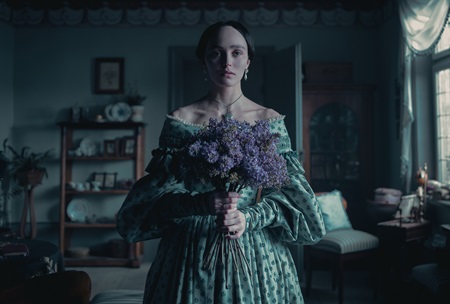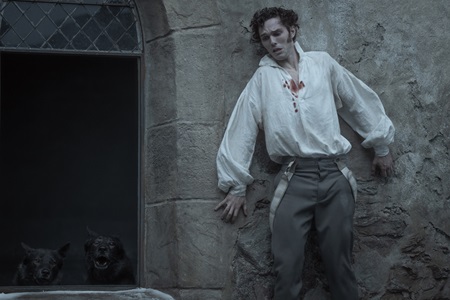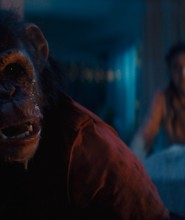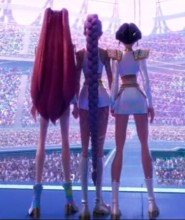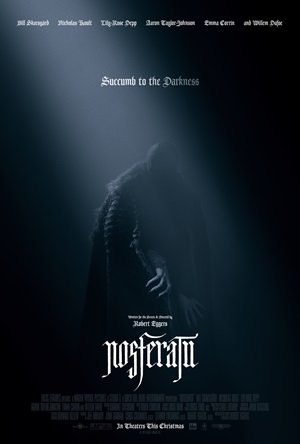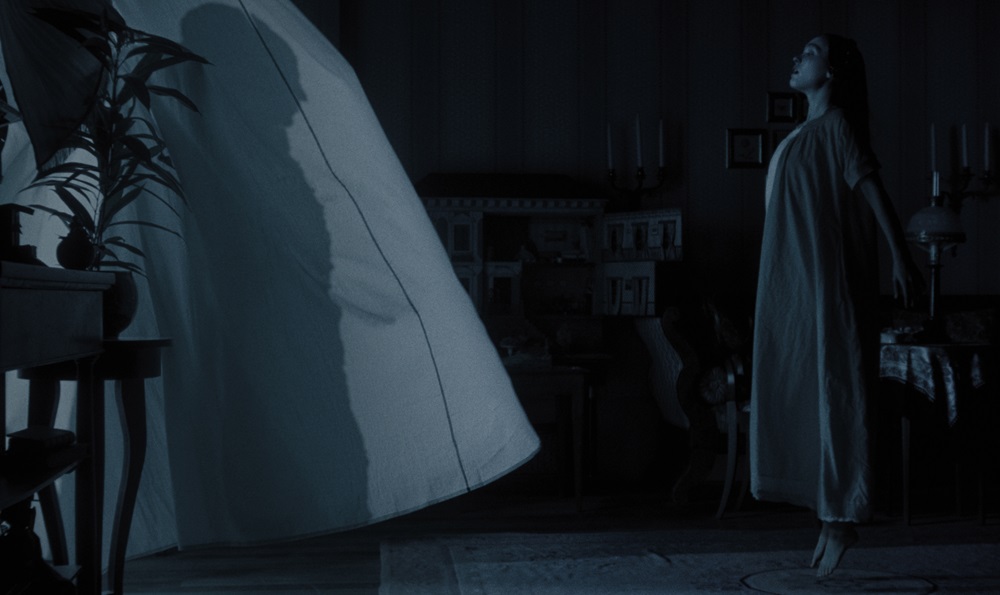
Eggers Tackles the Immortal Nosferatu with Mechanically Anemic Precision
Robert Eggers is a fascinating filmmaker. His works — The Witch, The Lighthouse, and The Northman — feel thematically linked, even though they do not tell stories that even passingly resemble one another. But they all feed off of similar emotions: isolation, longing, despair, regret, grief, lust. They stare into the abyss of the human condition, unafraid to revel in tragic self-destruction. Eggers does not make things easy for audiences, and if there is hope to be found in his savage chaos, it tends to be fleeting.
Now comes the director’s most ambitious project yet, Nosferatu. As indebted to Bram Stoker’s timeless novel Dracula as it is to two previous iconic adaptations (F.W. Murnau’s 1922 silent masterpiece Nosferatu: A Symphony of Horror and Werner Herzog’s 1979 expressionistic Eurotrash stunner Nosferatu the Vampyre), Eggers pulls out all the stops to put a new spin on this familiar tale of repression, love, and bloodshed. It is a suitable companion to his previous trio of cult favorites, and I imagine his legion of fans will be ecstatic to witness this feature’s supposed terrors right away.
Unfortunately, I was not moved by the anarchic, gothic, European excess. I found Eggers’s handling of the material beautifully composed, meticulously designed, thunderously scored, and — sadly — emotionally facile. There was no passion fueling the dual longings of the carnivorous, undead Count Orlok (Bill Skarsgård) and his chosen bride, the sexually repressed Ellen Hutter (Lily-Rose Depp). Most of all, while a constant sense of dread admittedly permeated the proceedings, I did not feel any tension or suspense. Everything was mechanically detached. Because of that, I had the worst time maintaining interest.
It all looks and sounds incredible. The film is a triumph of production design (Craig Lathrop), art direction (Paul Ghirardani), and costuming (Linda Muir). The practical makeup effects that help Skarsgård breathe life into Count Orlok are phenomenal. This demonic force of bloodsucking pestilence is a rotting corpse of unstoppable power, who maniacally leaps off the screen with gruesome majesty.
Best of all is the cacophonous score composed by Eggers’s The Northman collaborator Robin Carolan. His themes achieve an elegiac, discordant grandeur that sent chills down my spine. Carolan has written a Germanic thunderstorm of operatic excess that fits the material perfectly. Alongside I Saw the TV Glow, Evil Does Not Exist, and Challengers, this is easily one of 2024’s finest and most essential scores.
Also of note are the performances from Depp and Nicholas Hoult. As stated, Depp is the object of Count Orlok’s deepest, most depraved yearnings, the young woman unintentionally awakening the vampire from his malignant slumber when she was a lonely teenager gazing into the abyss and wanting something unique to happen to her. Depp crafts a performance of pent-up physical subjugation that has left her facing carnal urges she has been taught to fear and think of as sinful. She’s stunning.
Hoult is her distraught, yet still determined, husband Thomas, a banker sent to see Count Orlok in his dilapidated Carpathian castle by his sniveling superior, Mr. Knock (Simon McBurney). The young man comes face-to-face with death itself and somehow lives to tell the tale. Hoult gives Thomas’s fiery love for Ellen palpable intensity, and the film its only sense of emotional weight and heft. The meticulous complexity of his stirringly physical performance is a wonder.
While all of this is unquestionably great, it still wasn’t enough for me to invest in the film as a whole. I felt Eggers was playing in a similar sandbox as those who have gone before him (notably Murnau and Herzog, but also Tod Browning, Terence Fisher, and Francis Ford Coppola), but one irritatingly devoid of savage desire and amorous heartbreak. The director knows how to make it all look and sound incredible, but he seems resolved to keep the audience at arm’s length.
This film does possess an impressive ensemble, which includes Willem Dafoe, Emma Corrin, Ralph Ineson, and Aaron Taylor-Johnson, and each is more than up to the task of doing what is asked of them. But I found them as robotic as the production surrounding them. For all their multifaceted tenacity, not one left a lasting impression.
As for Skarsgård, he certainly looks the part, and his serpentine movements offer up a regal, hushed gruesomeness that’s insidious and noteworthy. But Eggers doesn’t give him a character to portray, just a sense of omnipresent doom with sharpened fangs and fingernails and a quick wit. While he exhibits those traits with eerily malevolent aplomb, it still lands him on the second tier of actors who have portrayed this character, with Max Schreck, Bela Lugosi, Christopher Lee, and Gary Oldman all far out in front of him.
Eggers is a maniacal talent with a singular vision. I’ll always be first in line to witness whatever he’d like to show me. But his Nosferatu left me feeling empty. It kept me at a frustrating distance, and even its tragic denouement of selfless sacrifice hit me as more perfunctory and preordained than authentically intimate. While the iconic monster at the center of this horror remains murderously inhuman, that does not mean he scares, and this makes this latest adaptation of Stoker’s source material a shockingly anemic misfire.
– Review reprinted courtesy of the SGN in Seattle
Film Rating: 2 (out of 4)


